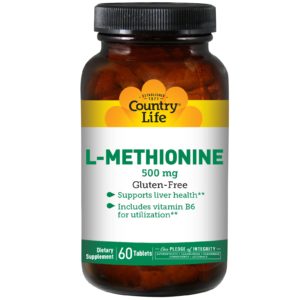Content
The benefits and harms of methionine for humans have attracted scientists for a long time. The substance is classified as a hepatoprotective agent that helps eliminate the effects of toxic poisoning. Among its main advantages are affordable cost and the ability to use it for preventive purposes.
What is methionine
Methionine is a sulfur-containing amino acid that is soluble in water and has a specific odor. In the human body, it serves as a donor of methyl groups. Methionine is often used in sports nutrition. This is due to the fact that the substance is actively involved in the formation of proteins. Moreover, it prevents the accumulation of lipids in liver cells. Due to its antioxidant properties, methionine cleanses the body of toxins and free radicals.
The pharmacological property of a useful substance is to compensate for the lack of amino acids. In medicine, methionine is widely used due to its metabolic and hepatoprotective properties. He participates in the process of processing fats, triggering metabolic reactions. By stimulating the growth of immune cells, it stabilizes the functioning of the entire body.

What is methionine for?
Long-term studies of methionine have shown that it is essential for humans. A useful substance enters the body in the composition of drugs and food. The amino acid is involved in the activation of vitamins, enzymes and hormones. It also speeds up the absorption of protein, which is an essential building block.
Among other things, methionine is able to reduce the concentration of phospholipids and cholesterol in the body. This is especially true for people with atherosclerosis. During pregnancy, a useful amino acid helps to solve problems with the placenta. For athletes, methionine is essential for building muscle and freeing the body from ammonia, which is produced by protein breakdown. There is also a positive effect of the amino acid on the functioning of the nervous system. It is often used to treat degenerative neurological disorders.
Sometimes a useful substance is used prophylactically to prevent various diseases. In this case, it is taken in reduced dosages, having previously excluded contraindications. There is also an opinion about the possibility of amino acids to promote weight loss. It is supported by the acceleration of metabolism against the background of the use of methionine.
The benefits and harms of methionine
Methionine is not synthesized by the human body, so it must come from outside. Daily use of a useful substance normalizes the work of all life support systems. It stabilizes digestive function and, in some cases, helps to cope with stomach ulcers.
Methionine has a valuable feature - it provides the production of molecules of various compounds. Among them, cysteine is isolated, which is necessary for the production of proteins.In addition, the amino acid protects liver cells, preventing the development of serious diseases. The benefits of methionine are as follows:
- participation in the process of producing adrenaline;
- lowering cholesterol levels;
- help in building muscle mass;
- prevention of diseases of the digestive system;
- positive effect on the condition of hair and nails;
- reducing the risk of developing an allergic reaction;
- diuretic action;
- treatment of depressive disorders;
- elimination of toxins from the body;
- radiation protection;
- acceleration of regenerative processes;
- restoration of immunity.
Energy metabolism in the body depends on methionine, which has a positive effect on its work. A useful amino acid provides transportation of polyunsaturated fatty acids. In addition, the substance has a beneficial effect on the quality of sleep. This is due to the elimination of the anxiety state. This compound is believed to significantly improve mood and brain function. In some cases, a beneficial amino acid is prescribed to eliminate allergic reactions. It has the ability to block the growth of histamine in the blood, which can help relieve rashes and itchy skin.
Methionine can only be harmful if consumed excessively. Due to the sulfur content, it changes the acid-base balance in the body. This reduces bone strength and stimulates the formation of calculus in the kidneys. Excessive intake of useful amino acids into the body can also provoke an imbalance in nitrogen balance. In schizophrenia, large doses of methionine aggravate the patient's condition.
Where is methionine found

Methionine must be ingested daily. Its greatest amount is found in dairy products. With an insufficient intake of a substance in the composition of food, vitamin complexes are used. The amino acid is found in sports nutrition for muscle building. Foods containing methionine include:
- egg;
- beef;
- cottage cheese;
- pork;
- hen;
- cheese;
- legumes;
- buckwheat.
Daily rate of methionine
The daily requirement for methionine can be influenced by certain factors. The daily norm of an average adult is 2-4 g. With heavy physical exertion, the need for an amino acid increases significantly. In bodybuilding, the rate is calculated individually, depending on body weight. 1 kg of weight requires 12 mg of the beneficial substance. Athletes also need to consider their training regimen.
Indications for the use of methionine
Doctors advise against taking methionine without essential indications. Before taking you should consult with a specialist. The medicine can be prescribed as part of complex therapy and as an independent remedy. The indications for use are as follows:
- cirrhosis;
- diabetes;
- lack of protein in the body;
- Alzheimer's disease;
- intoxication with chemicals;
- hepatitis;
- alcoholism;
- cholelithiasis;
- fibrocystic breast disease;
- rheumatoid arthritis.
For pregnant women, a useful substance is prescribed to alleviate the condition with toxicosis. In childhood, it is taken to prevent dystrophy, provoked by a lack of proteins in the body. In addition, the drug helps to avoid problems with the formation of the nervous system.
Sometimes an amino acid is prescribed for people with diseases of the genitourinary system. It normalizes urination and blocks the activity of bacteria that accumulate on the walls of the urinary tract. The most pronounced effectiveness of the substance is observed in relation to cystitis and urolithiasis.
People who are actively involved in sports use methionine not only to accelerate muscle gain, but also to eliminate the consequences after taking steroids. The tool helps to remove accumulated toxic substances from the liver, and prevents its destruction.
The amino acid is especially effective against atherosclerosis. One of the main factors provoking its development is metabolic disorders. The amino acid helps eliminate this problem, thereby improving vascular health.
Scientists have been studying the principle of the effect of methionine on cancer cells for a long time. As a result of many years of research, they have revealed that it is necessary for the growth of malignant tumors. If healthy cells can develop without this substance, then those affected by cancer die. In addition, the lack of amino acids helps to slow down the formation of metastases. Therefore, if you are susceptible to cancer, you should be especially careful when using a useful amino acid.

Contraindications to methionine
The harm of methionine to humans is possible only if used incorrectly. Care should also be taken if kidney dysfunction is present. In this case, taking methionine can increase blood nitrogen levels. This condition is fraught with problems with the nervous system and digestion. Against the background of azotemia, blood composition and blood pressure can also change. Typical manifestations of this disease include dry mouth and bleeding tendencies. Contraindications for the drug include the following:
- an abundance of meat products in the diet;
- heart diseases;
- encephalopathy of the liver;
- severe liver failure;
- high levels of methionine in the blood;
- age under six.
The main contraindication is the excess of the substance in the body. It is dangerous with a high risk of developing liver and heart disease. If the dosage regimen is violated, the following side effects may occur:
- drowsiness;
- symptoms of poisoning;
- allergic reaction;
- nausea;
- vomiting;
- tachycardia;
- stool disorder.
In some cases, in case of an overdose of a therapeutic agent, the patient becomes disoriented in space and time. There may also be a sharp drop in blood pressure and heart palpitations. In rare cases, a short-term loss of consciousness is possible.
If side effects occur, it is necessary to take adsorbents and rinse the stomach naturally, drinking plenty of fluids. Further intake of the amino acid is not recommended. In case of acute manifestation of intolerance, you should consult a doctor.
Rules for taking methionine
The tablet form of methionine is most often taken in combination with other useful amino acids. This increases the effectiveness of the treatment. The dosage is determined on an individual basis. When choosing it, the age of the patient and the nature of the course of the disease are taken into account. A single dosage for children over six years of age is not more than 500 mg. Adults can take 500 to 1500 mg at once. The number of receptions is 3-4 times a day. The treatment course can last from 10 to 30 days. After it is held, you should take a break of 10 days.
Athletes are advised to combine an amino acid with folate and vitamin B3. This promotes the production of adrenaline in the body. To achieve high results, you should follow a protein diet. But it's important to remember about moderation so as not to provoke an excess of methionine in the body.
The useful substance does not have a negative effect on concentration and the speed of psychomotor reactions.Despite this, it can only be purchased with a prescription from a doctor.
Take extra care when carrying a baby. It is advisable to report any symptoms that appear to your doctor. If an allergic reaction occurs, you must completely abandon the use.
Store the drug in a place protected from sunlight. The temperature should not exceed 25 ° C. Subject to the storage rules, methionine is suitable for five years.
Conclusion
The benefits and harms of methionine for humans should be studied even before taking it. This will help prevent serious side effects and cope with the disease successfully. Any dosage adjustment should be carried out under the supervision of a competent professional.

